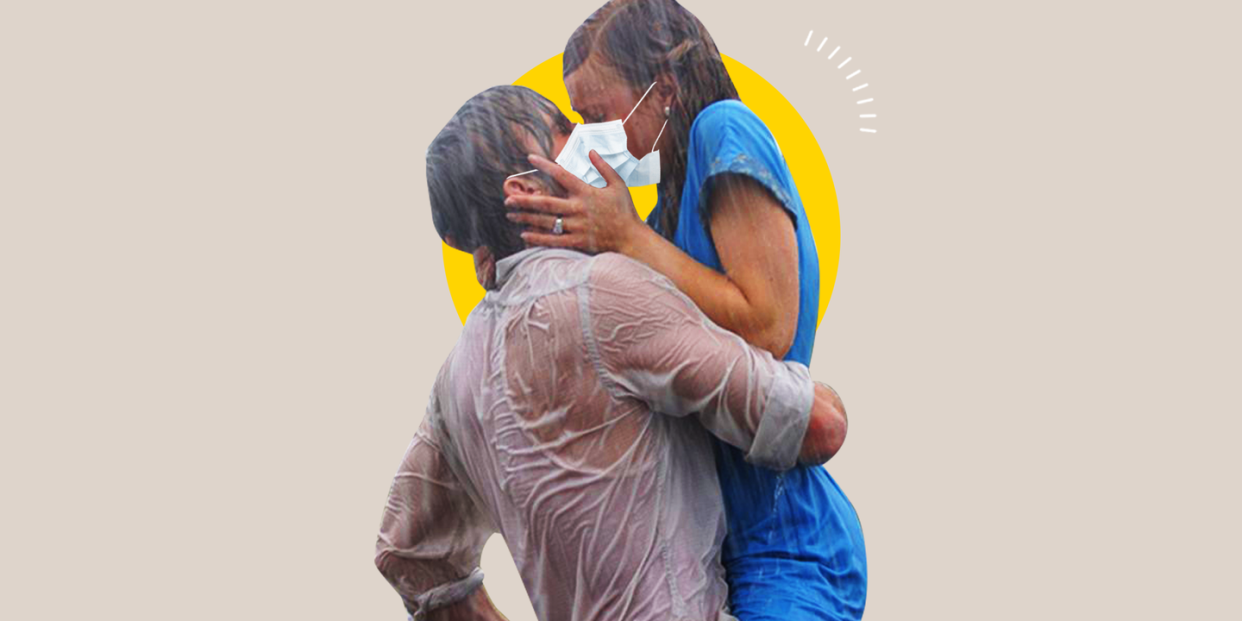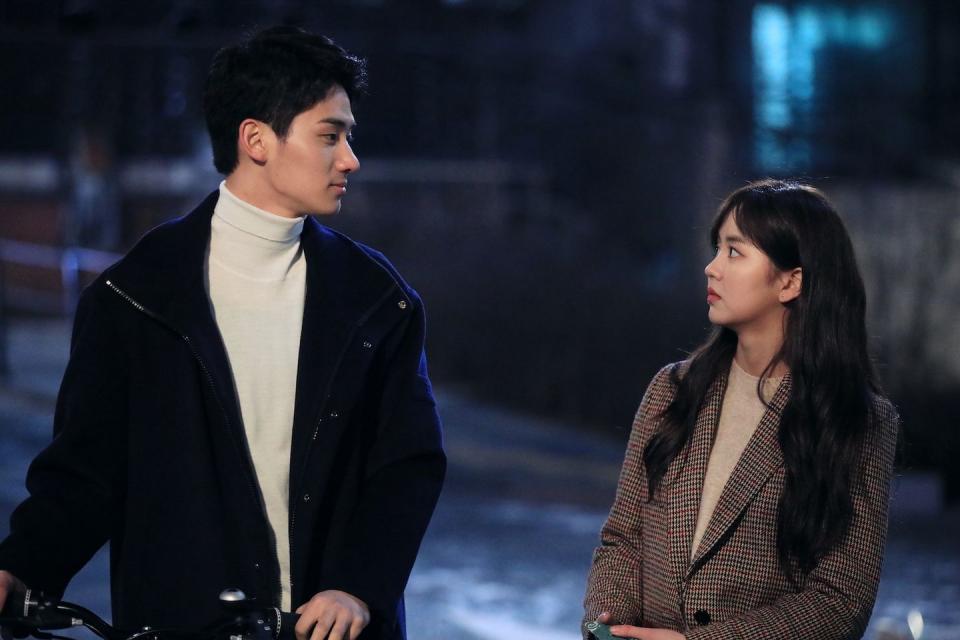Experts Say COVID-19 Could Drastically Change Sex Scenes for a Long, Long Time

I still remember the very first time I saw The Notebook. Well, more specifically, I remember the first time I saw that scene where Noah and Allie finally hook up. The sexual tension had been building the whole movie. They're in that abandoned house together, staring at each other, and you're practically begging for them to get it on. If you've seen that movie (which, if you haven't, what?) you know that scene is the turning point for them as a couple. And when they reunite later in the film and make out in the rain, it's so. damn. steamy. The Notebook is a classic because of those scenes. You believe in Allie and Noah because you see the chemistry in every kiss and touch. It's cheesy, but it's true.
Those scenes make romantic movies what they are. But with a global pandemic keeping most people from making any direct physical contact, those potentially iconic moments might not even make it into future movie and TV scripts, which is a total shame. Filmmakers, showrunners, writers, and the whole crew will have to make major changes. Basically, it's complicated. We talked to some experts about what it could look like.
Thankfully, we're not going to lose romantic storylines altogether.
“It's not about writing out the romantic journeys of their characters, but it is about considering that intimate arc,” says Ita O’Brien, a professional intimacy coordinator. Basically, they're going to have to think twice about everything. O'Brien has choreographed scenes for HBO’s new series I May Destroy You, and hit shows Sex Education, and Normal People. If you’ve seen Normal People, it’s pretty hard to believe the very intense and very realistic sex scenes aren't real. To some extent, they make the entire show. So yeah, Ita, and the people who work in show business alongside her, would know a thing or two about the importance of those scenes.
Screenwriter Sheila R. Lawrence, who's written for shows like Hart of Dixie, Ugly Betty, Gilmore Girls, and Love, Victor, says she would definitely still want to be able to do romantic scenes, and she doesn't think Hollywood should ignore it altogether. "That would seem very sad to me if there could be no contact even in our entertainment," she says. "But I think we have to acknowledge it and make it part of the story. Like if you've met someone, and there was attraction and you would normally start kissing...I think it might, in this day and age, be preceded by a conversation."
And those conversations might look kind of like discussions characters would normally have about STDs, but instead of talking about that kind of testing, they're talking about COVID testing. If it's happening IRL, it would have to be reflected in the scenes.
Some Hollywood people might want to avoid mentioning the pandemic altogether.
But other writers feel like it won't be as much of a factor going forward. With all of our newsfeeds and social media timelines flooded with COVID-19 news, the entertainment industry might want to veer away from those storylines as a form of escapism. Jen Kirkman, who's written for shows like The Marvelous Mrs. Maisel, explains there's usually whispers in the biz about what scripts will and won't work with producers. "What I've been hearing is that the industry wants to just not really mark this moment in time, and they want more aspirational viewing," she says. "So you're not going to see a movie about two people who can't see each other."
That's totally understandable. But also, totally ignoring the pandemic would seem super weird, since it has literally upended all of our lives for months now. And IDK about you, but I would actually be interested in seeing what a creative COVID-19, socially-distanced love story would look like—something that Kirkman is working on, BTW.
As for regular non-COVID related content going forward, if something's set in 2020 or later, Lawrence adds, it's the writer's responsibility to make sure main characters and extras are wearing masks, social distancing, and following proper protocols that would have been in place at the time. This not only makes the setting clear, but also sets a good example for viewers.
When it comes to the conceptualization of stories, Kirkman thinks writers won't let the pandemic interfere with their art. They'll continue to create whatever they feel compelled to create. "Honestly, by the time you write something, and it's purchased and rewritten and everything... it could take two years," she says. So by that time, the pandemic will (hopefully) not be top of mind anymore.
It could mean going back to the old school methods.
O’Brien says one of the possible tactics productions could use is to write scenes in a way that characters could maintain that romantic and sexual tension, while also keeping a safe social distance.
O’Brien says one way that could work is by stopping the scene right before things get ~saucy~, like they used to do in the 1950s. Back then—with actors like James Dean, Marilyn Monroe, and Audrey Hepburn—sex scenes were still such a scandalous thing in Hollywood. So the actors would get as close as they possibly could to each other, maybe share a kiss, and then right before they got it on, the camera would pan over to a fireplace (to symbolize the seriously hot sex they’re having, duh), or the screen would just fade to black.
It's an old-fashioned technique, but Rachel Flesher—who’s coordinated stunts and intimate scenes for shows like GLOW and Never Have I Ever—thinks it might make a comeback. She says, “Audiences have excellent imaginations.” Basically, you'll have to fill in the blanks yourselves. Not the end of the world!
Camera angles could prove to be seriously important.
Another more subtle way filmmakers might execute intimate scenes is by playing with different camera angles, and what Flesher refers to as “masking techniques,” which is a term that refers to the way cameras are able to hide the hits and punches when actors do a fight scene. Flesher explains, “It's something we already use for simulated sexually intimate scenes. But there are ways to do that with kissing. There are ways to cut it to make it look like we're getting ready to kiss.”
Editing tricks will come in really handy, too. And it doesn't need to involve any fancy Marvel-style CGI effects or green screens.
Bradley Bell, executive producer of soap opera Bold & the Beautiful, told The Hollywood Reporter that they plan on shooting intimate scenes with the actors eight feet apart—or maybe with them not being in the same room at the same time. He explained, "We'll shoot one side of the couple in a romantic scene alone in the room, but looking at a spot very close to them, and then shoot the other side alone. When we edit it together, it will look like they're nose to nose."
Coronavirus testing is also a major key.
The sorta-obvious (but also kinda tedious) third option is to make regular testing available on set, or having the actors and crew members involved in shooting intimate content self-isolate, and then re-test. It definitely sounds like a lot, and it's for sure going to take more time to get shows and movies done, but some international productions are already putting this into practice.
Last month, Netflix’s Chief Content Officer Ted Sarandos revealed in an op-ed that for their South Korean drama Move to Heaven, as well as romantic series Love Alarm, all cast and crew have their temperatures checked regularly. In Iceland—where testing is available even for people showing no symptoms—everyone working on the sci-fi series Katla got tested before filming resumed. And all those involved in Netflix Sweden’s rom-com Love and Anarchy volunteered to self-quarantine for 14 days before going on set.

The main concern, of course, is safety.
In a way, simulated sex scenes are stunts, too, because there are definitely risks involved when two partners are so close—even with padding, underwear, or all the proper nudity garments. And we’re talking about risks not just in the physical sense, but also the emotional and mental sense. With the added strain of a global pandemic, the stakes are even higher.
O’Brien expects that there will be a “heightened anxiety and fear regarding one's personal health,” even with COVID-19 safety protocols in place. It’s her job to listen to an actor's concerns, and create an environment where everyone is comfortable and confident in focusing on their roles.
“Adding one piece to an already giant puzzle is a huge additive,” Flesher says. “And making sure intimacy coordinators are there to help balance that new power dynamic, that even more intense power dynamic, will be incredibly important.”
“This is going to be challenging without doubt,” O’Brien says. But it really isn’t impossible.
To be fair, it's not that the sexy scenes are the be-all-end-all of romantic movies. Romance can exist without intimacy. But they are an incredibly powerful tool that, let's face it, we love. There's a reason why that moment when Rose's hand slides down the steamy car window in Titanic is burned into your brain, or why Blue Is the Warmest Colour kickstarted your sexual awakening. Sex scenes aren't just a way to demonstrate horniness, but a way to show vulnerability and emotion. Losing those moments would also mean losing a little bit of the authentic, relatable, human experience.
Thankfully, with a clear plan and some Hollywood magic, we won't lose them for good.
You Might Also Like

